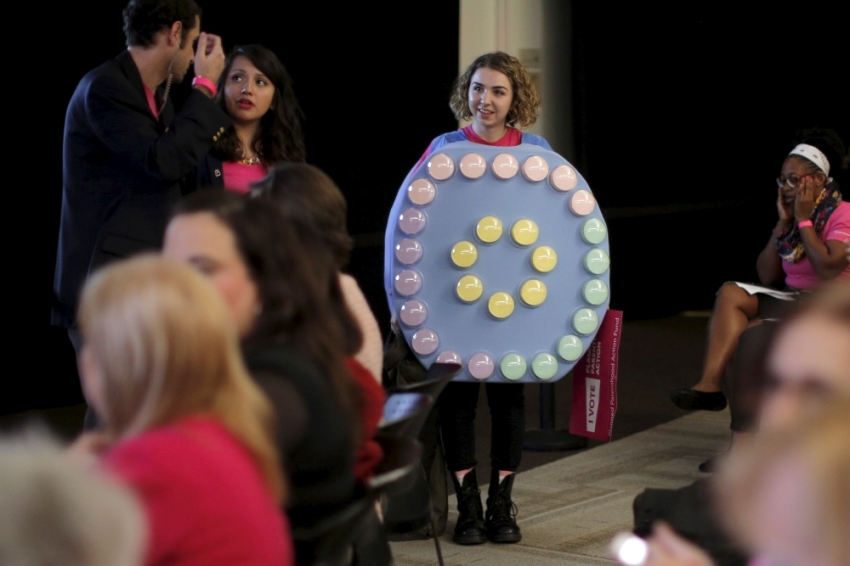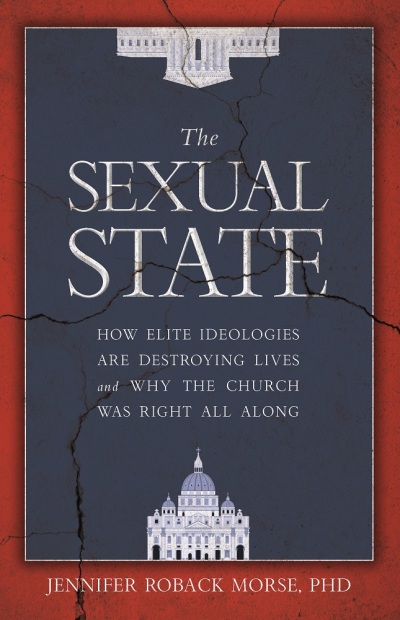Resisting Sexual Revolution Together May Be How God Unites Christians: Author

A robust repudiation of the sexual revolution should unite Christians of every tradition, says author Jennifer Roback Morse.
And resisting this ongoing onslaught side by side just might be the very thing God does to heal the Church of the many divides that abound, she believes, because there is no choice but to stand and fight together given the present cultural landscape.

Morse, who is the founder and president of the Lake Charles, Louisiana-based Ruth Institute explained in a phone interview with The Christian Post last week that for far too long, believers in Jesus Christ have been playing footsie with the ideology of the sexual revolution. This deceptive, deadly creed and the accompanying movement is fundamentally opposed to our faith, she insists, and it has created millions upon millions of wounded people whose voices are seldom heard.
In her latest book, The Sexual State: How Elite Ideologies Are Destroying Lives and Why The Church Was Right All Along, which was released last month, Morse unpacks how the sexual revolution is an interlocking, three-pronged dogma — contraceptive ideology, divorce ideology, and gender ideology — that has ruined countless lives and has never been properly combated. Morse also offers bold, straightforward advice to Christians regarding what they can do to not only anchor themselves in faith amid the chaos but to push back with the truth in their respective spheres of influence.
"My emphasis on the sexual revolution grew out of my conviction that social conservatives were getting clobbered," Morse said. "We're outgunned, we're outmanned, we're outspent, so what can we do?"
She realized that for many the harms of the sexual revolution have not been fully spelled out and the people who sponsored them have never been held accountable. Meanwhile, the victims — like children of divorce, and women who wanted to have children but could not because of either the contraceptive hormones lingering in their systems or abortions that scarred their bodies — are systematically excluded and marginalized, she said; their perspectives and experiences are rarely considered in the national consciousness.
Such was the thought process that inspired Morse's previous work, The Sexual Revolution and its Victims, a collection of her essays that addressed many of the same themes she expounds upon in The Sexual State in a more sustained form of argument.
The author argues throughout the book that the sexual revolution is fraught with many internal contradictions, and is so irrational it necessitates ever-increasing amounts of state power to maintain it as it continues to ravage communities. The ruling class and America's cultural elites have wielded propaganda and public policies to promote and enshrine what they believe is their inalienable right to sexual hedonism to great, devastating effect, she writes.
Morse spends a few chapters exploring how the contraceptive part of this ideology asserts that modern society should do everything possible to separate sex from making babies. But the big problem with that is that sex does, in fact, make babies, Morse notes.
"And if you think it is possible to create a whole society where sex doesn't make babies, you're going to do a lot of work to keep that belief system alive," she explained to CP.
The divorce ideology of the sexual revolution, which relies on the notion that kids do not need their own parents because kids are resilient and adults can do whatever they want, is best showcased in the legal regime of no-fault divorce, which has proven disastrous, Morse argues. Children do indeed need their own parents and to say otherwise, one will have to work hard to convince others that it is true.
"But this is what we've been doing since 1968, telling people that it doesn't matter, that children will get over it, and if they don't get over it, we'll take them to therapy," Morse said.
"Because this is irrational, you have to keep working on it. You have to keep suppressing the evidence that comes out to contradict the ideological line."
And the third leg of the sexual revolution, Morse says, is gender ideology. She argues this has morphed over the years from the assertion from some feminists that men and women are essentially no different to the radical transgender idea that the human body has no meaning whatsoever and can be reconstructed, complete with state-funded surgical procedures in pursuit of the physically impossible goal of changing ones biological sex.
"It's completely inhuman and it's an attack on the human body," Morse asserted, and that is precisely the reason why Christians must not acquiesce.

Although many contemporary evangelicals have accepted forms of contraception, provided they are not abortifacients, some are now publicly reconsidering their views and saying that the Roman Church has been right all along, like Morse once did as a Catholic who once disagreed with her church's teaching.
Earlier this summer evangelical author Julie Roys, formerly of Moody Radio, urged evangelicals to rethink their embrace of contraception.
"Clearly, the mentality that drives abortion, drives contraception. And when evangelicals embraced contraception they began thinking like pragmatists," Roys wrote in a three-part series on the subject.
"Children became liabilities, not blessings. Marriage became a means to personal fulfillment, not family and sacrifice. And birth control became essential to personal health, as though our natural design was somehow defective."
And contrary to that pragmatic thinking, Scripture does not teach that sterilizing sex is key to human flourishing, she went on to say.
Morse finds such reconsideration happening among other Christians encouraging.
"I think it would be tragic if the Catholic Church folded on its ancient teachings now because we now have the evidence to see that they've been right all along. The evidence about the physical harms associated with birth control, the evidence is right under our noses that contraception does not prevent unwanted pregnancies," Morse said.
"We need to take courage. We who believe in the Gospel and who love each other as fellow Christians, we need to be unafraid of these matters."
"And the Lord can heal this," she emphasized. "He has healed some terrible things in the history of the human race and He can heal us too. But we have to let Him."
Few people go all in for every aspect of the sexual revolution, she elaborated. Even many secular types recognize the harm no-fault divorce has unleashed, for instance. Notable radical feminists and lesbians fiercely oppose gender ideology, particularly the medical transitioning of women and children, and given the growing numbers of people who are in one way or another fed up with some corner of the revolution, possibilities present themselves for new alliances that seemed unlikely before, she said.
Yet socially conservative Christians have not addressed the heart of the matter, she continued, and their advocacy has thus been compromised, unpersuasive, and ineffective.
Past campaigns in recent years, for example, such as efforts to preserve the traditional definition of marriage as a union between one man and one woman, have been undermined from within due to Christians avoiding saying anything negative about the culture of divorce or artificial reproductive technologies, lest they offend their friends and others who have embraced those things, she said.
"All this kind of hanging on to stuff has led people to be basically sitting ducks for the next round of whatever the craziness is," Morse said.
And that craziness is intensifying as more and more people, Christians and non-Christians alike, are expressing their horror at how children and teenagers suffering from gender dysphoria are today prescribed puberty suppressants and cross-sex hormones, and are being approved for permanent, body-altering surgeries, all now backed with the machinery of the government and elite sensibilities.
"We're talking about underage people who are in no position at all to say 'I'm not really a girl because I think I'm not really a girl.' She can't get a driver's license or get her ears pierced without her mother's permission. And you're going to go with her judgement about whether she is a boy or a girl, and do physical things to her body that are irrevocable? Really? That's what we're going to do?" Morse said, outraged.
"It's because we haven't been willing to say that the human body is something [that matters] and we don't have the right to just mess around with it."
Morse tells her fellow Catholics that if they are to be successful in their response to the sex scandals now being exposed in the Church they have to relinquish whatever little thing they are holding on to that is contrary to Church teaching. And that is because those little things, whatever they may be, are the very things that will keep them from being effective when they need to be effective witnesses, she maintains.
For those who pick up a copy of The Sexual State, Morse hopes they will recognize as they read that they are not alone in however they have been scarred by the revolution's rage; that their suffering is not entirely their fault; and most importantly, that they can recover from it. Helping people with these struggles is a key part of what Morse does by day for The Ruth Institute with their retreats on healing family breakdown, which is her organization's core mission.
"You were fed a line of baloney, and a lot of people were too," she frequently tells those who attend their workshops, when speaking of the revolution's promises of sexual liberation that proved to be destructive.
From a more broadly social perspective, she hopes Christians as a whole will be inspired to stand and fight.
"I hope people will no longer be naive about whether this stuff is harmless. It's not harmless," Morse said, "and I hope people will not go back to normal. Let there be a new normal in your life. The new normal is that you're going to see things as they really are, and you really will be more free."
"And given the damage of the sexual revolution," she reiterated, "this could be the thing that heals the divisions among Christians. The Lord can, and I believe is trying to heal these divisions because we have no choice but to work together and fight shoulder to shoulder. And I think that could be, if we let it, one of the great fruits of this whole thing."
"That's the sort of thing God does. He takes our crap and turns it into something good."



























